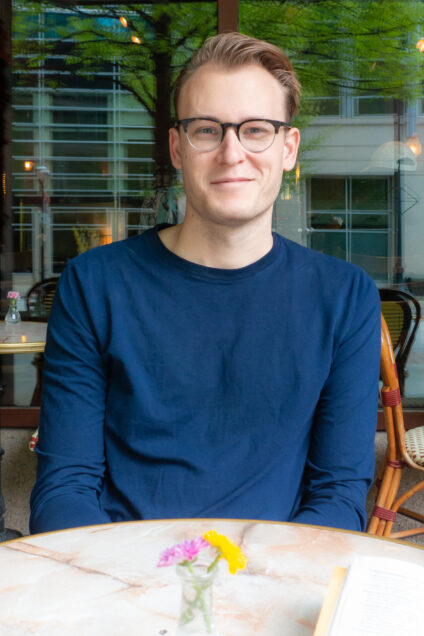By Violet Li

James Crissman is a PhD student focused on visual communications, information accessibility and governance, misinformation, and algorithmic injustice. Recently, Alyssa Hance, the Research Assistant from Communication Research Center, interviewed him where he shared insights on his visual communication research. This conversation shed light on his academic journey, how he balances rigorous research with daily student challenges, and offered valuable advice for those on their own academic paths.
Alyssa: “What is something you find fascinating about your research?”
James: So, like integrating some of my past experience and passions,
you know, I really have an interest in Visual Communications. Just in my anecdotal experience online, I see just how much of our communication is based around images, especially on social media, and even in news contexts, right? It’s the images that
grab our attention, are what can give us a lot of emotion, and even reactions to things that we see online. So, that is an area of focus that I find really interesting, and also one that seems like it has just so many unanswered questions, too, as well, especially with how fast things are moving in that world, online. And just I think that images also have an incredible impact as well. That is under studied and not known as well as it should be.

Alyssa: “How do you balance work and school as a BU student?”
James: I take it day by day, that’s for sure. Yeah, I have had to learn a lot of skills and personal organizing. And I’ve really leaned into the digital side of that, you know, keeping a digital calendar, keeping digital notes, and having it all at my fingertips has been really helpful for that. But yeah, other than that, it really is just taking it day by day and focusing on the things that I think are the most important to get done. And so, it’s constant triaging, focusing on the things that I need to get done that day. But, you know, important to being a PhD student is also focusing on your own interest in research. So, with being a PhD student, it’s so important to keep that in mind. And yet, it’s so easy to let that fall by the wayside. So, getting all of my other responsibilities done and then setting aside time in order to read the articles or dig into some data or something that I think is really interesting is super important. It’s something that, personally, I find really difficult, to set that time aside, but so important; I try my best to do that.
Alyssa: “What advice would you give other students starting their academic journey?”
James: I think it’s really important to find the things that interest you and that you are passionate about, right? And you’re always gonna have responsibilities at school that you have to take care of. But what’s really going to keep you going and motivated are finding those things that are really interesting. And that’s, in my opinion, that’s what academia is all about. Right? It’s about, you know, really digging into the things that you want to, more than anybody else, right? Because that’s how we’re going to build our knowledge base is by having those people that are extremely passionate about one topic or another. So, finding that makes everything else worth it.
Alyssa: “What’s one thing you wish you knew before starting your Phd? You took some time off to work in the industry before pursuing your masters, right? That’s a different route than the one most people take, which is going straight through.”
James: I mean, also, side note, I totally recommend [taking some time to work in the industry] to anybody. Just because I think I’ve learned a lot of skills and day to day abilities that are super helpful, even just as simple as, you know, keeping track and responding to emails. And just knowing how to talk to supervisors or professors like that. That’s just like a very valuable skill that you learn just by working.
Uh, one thing I wish I knew before going in, was just how to navigate my time on campus? Because I’m so used to the work space, where you’re sitting down at one desk, all day, right? And that’s just so different from being on campus running around in between classes. And the time management is very different in that aspect, too. So I think, you know, having some of that knowledge about how to manage time on campus is super valuable, and one that I was definitely out of practice on.
Alyssa: “What type of involvement do you have in the CRC?”
James: So, I definitely come and utilize that space as a study space, somewhere to work, but more than anything else, it really is a place for me to socialize and talk with my cohort, which is still extremely important, right? And it’s more than just networking. It’s, you know, bouncing ideas off them and hearing other people’s research and what they’re interested in. And I really feel like my mind gets going in the CRC more than anywhere else, because I can collaborate with other people that are working on really cool research as well.
Following one’s passion is crucial for maintaining motivation and contributing to our body of knowledge on the academic path. It is this relentless pursuit of interests that not only fuels our journey through challenges but also enriches the broader academic community with diverse insights and discoveries. Let passion guide our research, shaping a more vibrant and informed academic world.